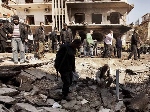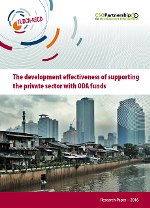Published on Thu, 2016-09-08 18:34
In the context of the Pilot Project for the Promotion of Social Dialogue in the Southern Mediterranean Region (SOLiD), in partnership with the International Trade Union Confederation (ITUC) and BUSINESSMED, ANND held a two day seminar in Beirut on 7 and 8 September 2016, to discuss issues related to Business and Human Rights. Roberto Bissio, Social Watch Coordinator, joined the workshop participating in Session 1, The privet Sector and the New Development Paradigm - A Rights Based Perspective, Financing for Development from a Rights Based Approach (see his intervention below). |
Published on Thu, 2016-09-01 19:01
After more than five years, the conflict in Syria represents a catastrophic failure of the “international system” in terms of maintaining basic human rights (including the right to live), peace and stability. This system, including the UN as well as influential world states and organizations, has failed to reduce the escalation of conflict, let alone create effective mediation processes to reach a decent solution. Furthermore, many international and regional actors have fueled the conflict by providing political, military, logistic and financial support to the warring parties, investing in identity politics to deepen polarization and strengthening hostility and a spirit of revenge in their local affiliates. The conflict has largely destroyed Syria’s economic structure, foundations and institutions, severely depleting resources and capital, human capital, social capital and economic governance. Economic priorities shifted as all subjugating powers reallocated resources to fuel violence and its related activities. This economic environment came along with the absence of rule of law, property rights, and accountability, in addition to a surge in corruption. It generated new actors and/or changed the behaviour of previous actors to be part of new rules of game: that of imposing hegemony by force and building new political economies to sustain the conflict. Effectiveness and equity, as goals of economic policy, have been diminished as the authorities sacrificed the core development goals and achievements to serve the new “development in reverse” dynamics. |
Published on Thu, 2016-09-01 18:57
Paraguay faces strong challenges in meeting the Sustainable Development Goals (SDGs), with their focus on reducing inequalities and their complex links to production and growth. The right to health has not been met yet and social protection is still not a right for everyone. Even if there is a systematic improvement of the indicators of the past decade, these positive results were achieved only after years. After more than a decade of economic growth, lost opportunities in terms of welfare, the lack of productive transformation and tax justice place the country in an unfavourable position to meet the goals of reducing inequalities and ensuring socially and environmentally sustainable growth. Social protection is still a right to aspire to. Current contributory programmes are fragmented, incomplete and have a low level of coverage. The coverage of non-contributory programmes has increased significantly in recent years, but the lack of comprehensiveness hinders the possibility of substantial impact in reducing the risks that people face throughout their lives. |
Published on Thu, 2016-09-01 18:55
Development funding is increasingly being channelled through Development Finance Institutions. These national institutions are particularly solicited when using development aid money to free up further investment, known as leveraging. When used well, these tools have the potential to allow sectors of developing countries’ economies that wouldn’t otherwise attract investment to strengthen and expand. However, this joint TUDCN-CPDE research paper highlights a number of alarming shortfalls in how these institutions operate that can seriously undermine international development goals. This new report, entitled ‘The development effectiveness of supporting the private sector with ODA funds’ examined nine Development Finance Institutions (DFIs). It is jointly produced by the CSO Partnership for Development Effectiveness (CPDE) and the TUDCN. Five case studies (available below) provided a background for the study which found that DFI practice is lacking in three vital areas : |
Published on Thu, 2016-09-01 18:53
In August, the World Bank concluded a major policy review process to adopt a new Environmental and Social Framework to replace its suite of “safeguard” policies – the policies designed to ensure that development activities financed by the Bank do not cause harm to communities or the environment. The outcome of this four-year review can be summed up in ten words: The safety net got bigger, and so did its holes. First, the good news. The new framework covers a broader scope of social issues than the old one. The policy now places social impact assessment and management more on par with that of environmental issues which historically have received greater attention in development projects. The framework now also has provisions to prevent discrimination in Bank-financed activities and requires assessment and mitigation of impacts on “vulnerable or disadvantaged” groups. |
SUSCRIBE TO OUR NEWSLETTER







